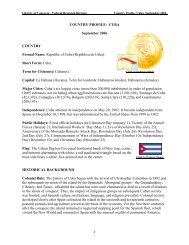1 - American Memory
1 - American Memory
1 - American Memory
You also want an ePaper? Increase the reach of your titles
YUMPU automatically turns print PDFs into web optimized ePapers that Google loves.
258<br />
alTorded union employees during such period will constitute strike benefits for<br />
such employees. Since military cargo is exempted from strike action, PMA says<br />
tliat the combined work opportunity represented by the two exemptions will<br />
significantly increase the union's ability to withstand a strike and thus reduce<br />
nmnagement's economic power in the dispute.<br />
With the conclusion of U.S. involvement in the Viet Nam conflict the average<br />
monthly volume of strike exempted military cargo, other than liquid bulk,<br />
moving through U.S. Pacific Coast ports has been dramatically reduced—from<br />
517,000 revenue tons in 1971 to 308,000 revenue tons in 1973 or by over 40%. The<br />
estimated average monthly volume of commercial cargo, other than liquid bulk,<br />
moving in 1973 between U.S. Pacific Coast ports and Hawaii, Guam and the<br />
oflier Pacific islands specified in the bill is 301,000 revenue tons. Therefore, a 30<br />
day resumption of operations In 1973 under injunctions contemplated by the<br />
hill when combined with the customary exemption of military cargo would<br />
have resulted in a total strike exemption for 600,000 revenue tons of cargo as<br />
compared with the exemption for military cargo alone of 517,000 tons during<br />
the 1971 longshore strike.<br />
It should be noted that military cargo moves predominantly from San Fran-<br />
cisco Bay ports and as a consequence the total work opportunity made possible<br />
in part by this bill will be centered at such ports. According to the ILWU's house<br />
paper, The Disimtcher, between February 17-19. 1972, nine thou.'Jand five hundred<br />
and sixty-four ILWU members participated in the ratification vote on the agree-<br />
ment settling the 1971-1972 longshore strike. It is Interesting to note that of<br />
(he votes cast by the San Francisco locals 74% were in favor of the agreement<br />
while only 70% of the votes cast by all other West Coast locals were favorable<br />
to tlie agreement. If the work opportunity represented by strike exempted cargo<br />
Is to be considered as a strike benefit, then one would have expected a much lower<br />
percentage of favorable votes by the San Francisco locals.<br />
With minor exceptions cargo moving between the U.S. Pacific Coast and the<br />
Islands specified In the bill is handled through the ports of San Francisco Bay<br />
(Oakland and San Francisco city) and Los Angeles Harbor (Los Angeles city<br />
and Long Beach), California; Portland. Oregon; and Seattle, Washington, but<br />
primarily through the two Indicated California ports. For example, in calendar<br />
year 1973 only 1.8% and 3.6% of the total non-bulk cargo handled at the ports<br />
of Portland and Seattle involved cargo moving to and from the islands covered<br />
by the bill. Even for the two California ports the percentage of cargo to be ex-<br />
empted by this bill and as military cargo is modest. In 1973 the ports of Ix>s<br />
Angeles Harbor and San Francisco Bay handled 14.1.')6.000 tons and 9,347,000<br />
tons of non-bulk cargo respectively of which only 13.7% and 6.4% was cargo<br />
moving to and from the communities specified in the legislation.<br />
As a practical matter, enactment of this legislation and such use as may be<br />
made by the chief executives of the island communities of their permissive au-<br />
thority to seek an injunction will neither abridge or weaken the union's right to<br />
strike nor weaken its strength within tJie collective bargaining process, i.e.:<br />
1. In respect to the longshore union only 3 to 4% of the total man-hours<br />
expended on cargo moving through U.S. Pacific Coast ports will be strike ex-<br />
empted, which is not significantly greater than the volume previously exempted<br />
as military cargo.<br />
2. Those members of management who would resume operations under the<br />
strike exemption contemplated by the bill would not. because of their minority<br />
position within the management group, be able to add anything to the bargaining<br />
strength of the management side of any dispute.<br />
3. Because of the economic Incentives previously referred to^retroactlve wage<br />
payments, and the potential impact of economic regulation by the FMC—those<br />
members of management resuming operations would still be fully subject to the<br />
economic pressures being applied by the union.<br />
Mr. Chairman, it is our belief that the operation of this legislation if enacted<br />
will not change the economic bargaining power of either side to a collective bar-<br />
gaining dispute. To the extent that the Governor of Hawaii or the Governor of<br />
Guam elect to exercise their authority to seek an exemption for their com-<br />
munities of any Pacific Coast longshore or offshore maritime strike, we are pre-<br />
pared to provide within our capability the necessary service while at the same<br />
time continuing to participate in the collective bargaining process in the same<br />
manner and to the same degree as we would in the absence of such enacted



![Albert Einstein Papers [finding aid]. Library of Congress. [PDF ...](https://img.yumpu.com/21604228/1/190x245/albert-einstein-papers-finding-aid-library-of-congress-pdf-.jpg?quality=85)





![American Colony in Jerusalem Collection [finding aid]. Library of ...](https://img.yumpu.com/17941275/1/190x245/american-colony-in-jerusalem-collection-finding-aid-library-of-.jpg?quality=85)



![Piccard Family Papers [finding aid]. - American Memory - Library of ...](https://img.yumpu.com/17941234/1/190x245/piccard-family-papers-finding-aid-american-memory-library-of-.jpg?quality=85)


